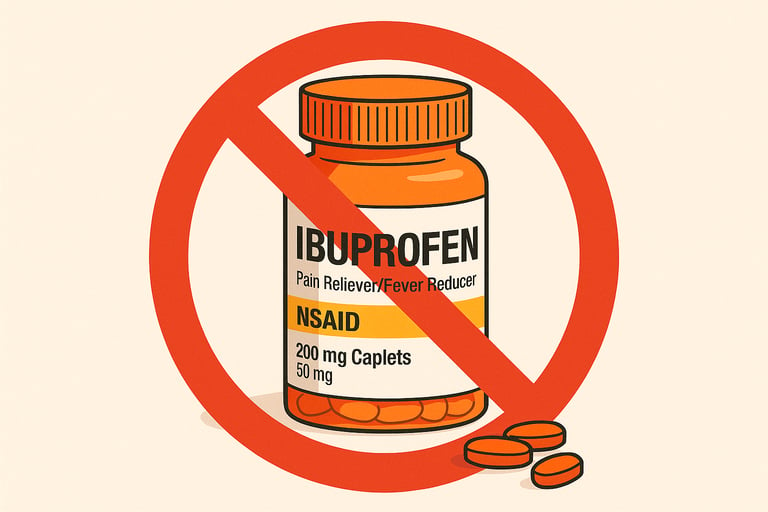When Not to Take Ibuprofen: Situations and Conditions to Avoid
Learn when not to take ibuprofen. Certain conditions like kidney disease, ulcers, heart problems, and pregnancy can make ibuprofen unsafe.


When Not to Take Ibuprofen: Situations and Conditions to Avoid
Ibuprofen is one of the most commonly used medications for pain and inflammation. While it can be safe and effective for many people, there are situations where ibuprofen use can actually do more harm than good.
Knowing when not to take ibuprofen is just as important as knowing when to use it.
Why You Shouldn’t Take Ibuprofen in Every Situation
People often reach for ibuprofen without much thought, whether for headaches, muscle soreness, or fever. But ibuprofen works by blocking enzymes that also protect your stomach and kidneys. That means in certain situations, ibuprofen can worsen existing health problems or create new ones.
Conditions Where Ibuprofen Can Be Harmful
Stomach Ulcers and Digestive Issues
If you have a history of stomach ulcers, gastrointestinal bleeding, or chronic acid reflux, ibuprofen can increase the risk of bleeding and irritation. Even occasional use may trigger pain or worsen the damage.
Kidney Disease or Kidney Problems
The kidneys play a key role in filtering ibuprofen out of the body. For people with kidney disease, reduced kidney function, or dehydration, taking ibuprofen can put dangerous strain on these organs and lead to worsening damage.
Heart Disease and High Blood Pressure
Ibuprofen can raise blood pressure and increase the risk of heart attack or stroke, especially with long-term use. If you have a history of heart disease, heart failure, or uncontrolled hypertension, it’s important to avoid ibuprofen unless a doctor specifically approves it.
Liver Conditions
Although ibuprofen is less damaging to the liver than acetaminophen, people with existing liver disease should still use it cautiously. The liver is part of the drug-processing pathway, and strain on this organ can worsen liver health.
Asthma and Allergies
For some people with asthma, ibuprofen and other NSAIDs can make breathing problems worse. This happens because these drugs may tighten the airways in sensitive individuals, leading to wheezing, coughing, or shortness of breath. Not everyone with asthma will react this way, but the risk is high enough that doctors often recommend caution.
Allergies are another concern. If you’ve ever had a reaction to ibuprofen, aspirin, or similar medications — such as hives, facial swelling, or difficulty breathing — you should avoid ibuprofen unless a healthcare provider has confirmed it’s safe. These allergic reactions can sometimes be serious or even life-threatening.
Pregnancy and Certain Life Stages
Pregnancy is one of the most important times to avoid ibuprofen. In the later stages, ibuprofen can interfere with the baby’s heart and kidneys, and may even affect blood flow before birth. Because of these risks, most doctors recommend staying away from ibuprofen entirely during the third trimester.
Even earlier in pregnancy, ibuprofen should only be used under medical supervision. Safer alternatives, like acetaminophen, are usually preferred. If you’re pregnant or trying to become pregnant, it’s best to check with your doctor before using ibuprofen for any reason.
For more on taking Ibuprofen when you're pregnant, click here.
Safer Alternatives
If you’ve been advised not to take ibuprofen, there are other ways to manage common issues like headaches, muscle aches, or minor injuries:
Acetaminophen (Tylenol): Often used for pain and fever relief. It doesn’t irritate the stomach like ibuprofen, but high doses can stress the liver.
Non-drug approaches: Depending on the type of pain, options like applying a heating pad, using ice packs, gentle stretching, getting enough rest, and staying hydrated can provide relief without medication.
For more on this, and for information on natural alternatives to pain relief, click here.
Final Thoughts
Ibuprofen can be a helpful medication when used responsibly, but it’s not right for everyone. If you have conditions like ulcers, kidney disease, heart problems, or asthma — or if you’re pregnant — it’s best to avoid ibuprofen unless your doctor gives the go-ahead.
Knowing when not to take ibuprofen can protect your long-term health and prevent serious complications.




